Mini Low FODMAP Gingerbread Muffins look, taste and smell like the holidays. These have classic, rich gingerbread flavor – with a low FODMAP amount of molasses! The aromas that will waft through your home are positively irresistible. Read more about the hows and whys of this low FODMAP gingerbread recipe, which also features dried cranberries and nuts.
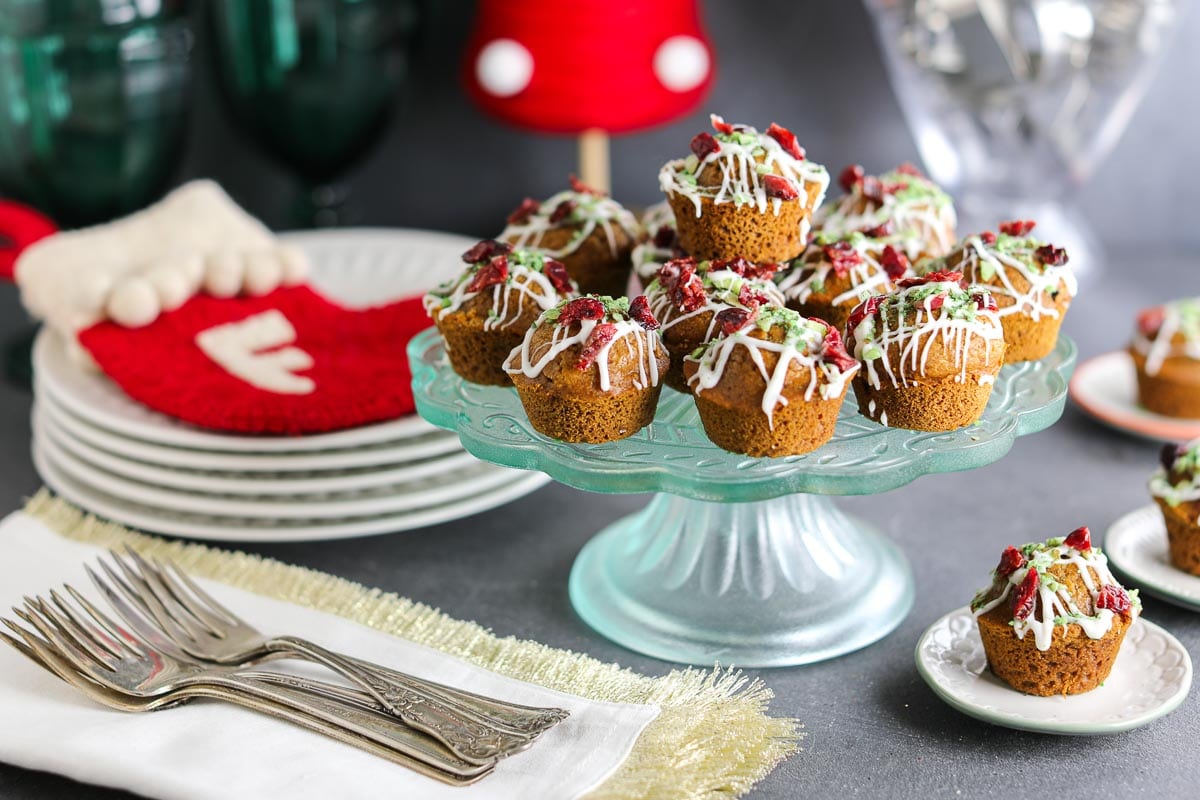
Creating Rich Gingerbread Flavor In A Low FODMAP Recipe
Ah, gingerbread. Whether it is soft-style and cake-like or made into a cookie (like rolled cut-outs or chewy ginger cookies) molasses is part of the primary flavor profile. And while there is a low FODMAP serving size of molasses, it is small – 5 g or 1 teaspoon. So, when we are creating a low FODMAP gingerbread recipe we have to get creative.
Luckily molasses is potent in flavor, so a little goes a long way. One thing the low FODMAP baker can do is to use the amount of molasses per serving that is low FODMAP but then use other sweeteners that contain no FODMAPs, like sugar, brown sugar or rice malt syrup, or a sweetener with more generous serving sizes like maple syrup and corn syrup. (Corn syrup is not the same as high fructose corn syrup, BTW).
We think ( we know!) these mini Low FODMAP Gingerbread Muffins will thrill you!
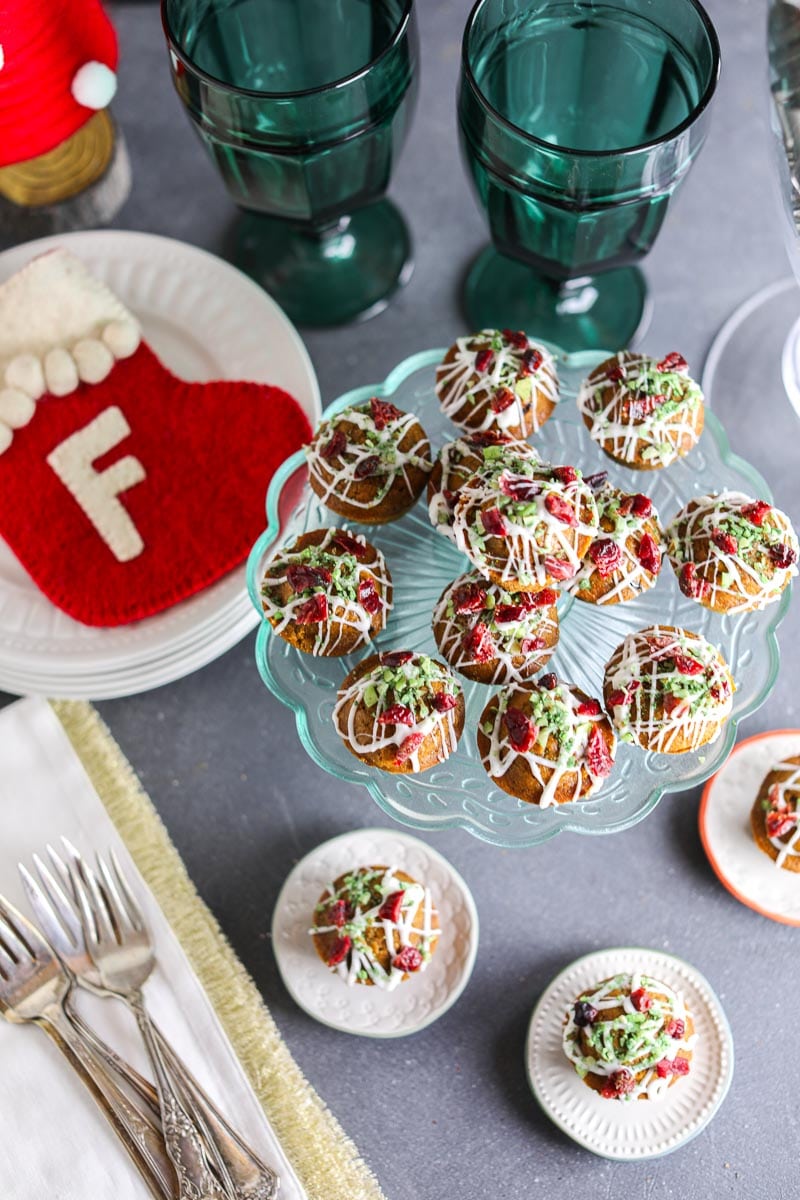
Then, we can look at spices. Allspice, ginger, cinnamon and cloves enhance the flavors that we associate with gingerbread. By using them, often in combo, in a gingerbread recipe we can get very close to the flavor of traditional gingerbread recipes.
And, while it is not absolutely necessary, the addition of espresso powder in this recipe provides a depth of flavor that we really like.
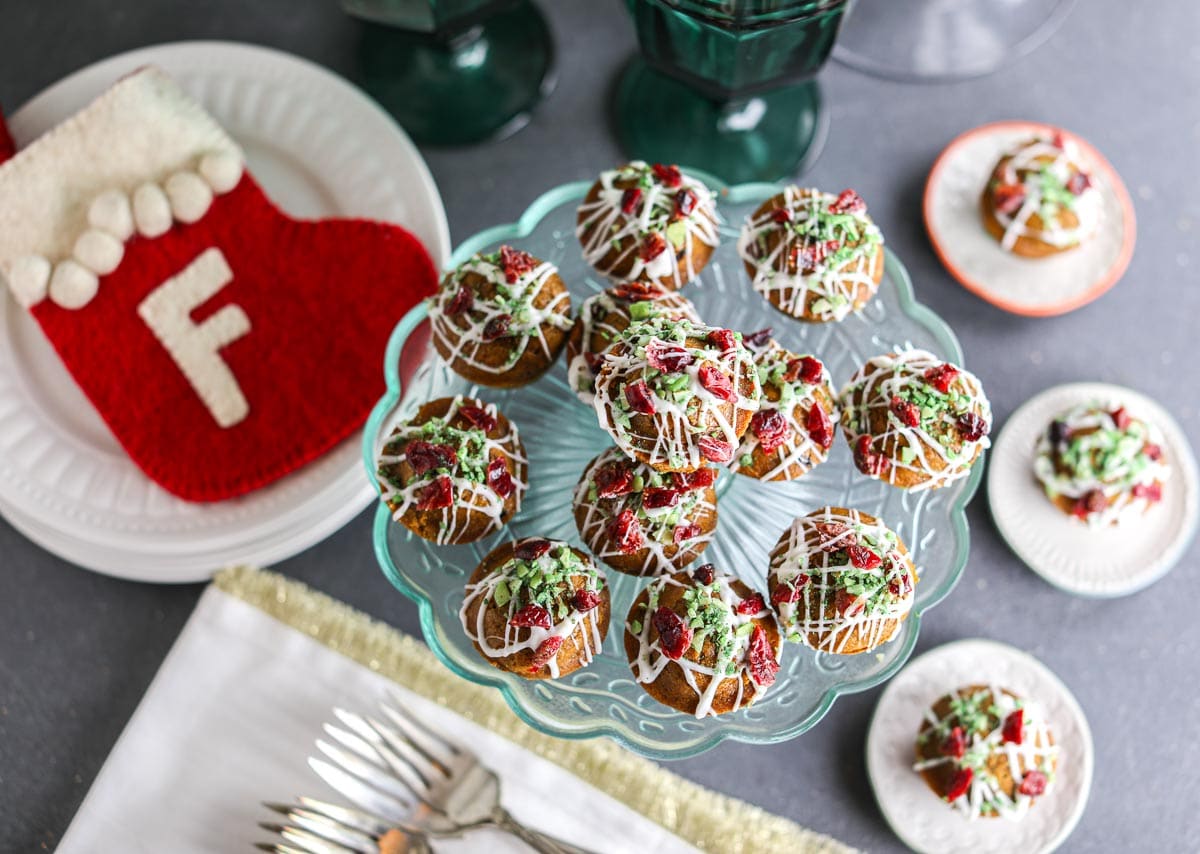
Built In Portion Control
Hopefully you know by now that the low FODMAP diet is very dependent on an understanding of portions. 80 g of avocado might be considered high FODMAP, but 30 g is low FODMAP! Sometimes the amount is close: 20 g of milk chocolate is low FODMAP; 30 g veers into Moderate territory.
You might find these articles helpful:
The reason why I am pointing this out now is because with mini muffins, such as these Low FODMAP Gingerbread Muffins, you have built-in portion control! It can make your management of the low FODMAP diet easier. Stick with the suggested serving size and you will be eating low FODMAP – suitable for Elimination.
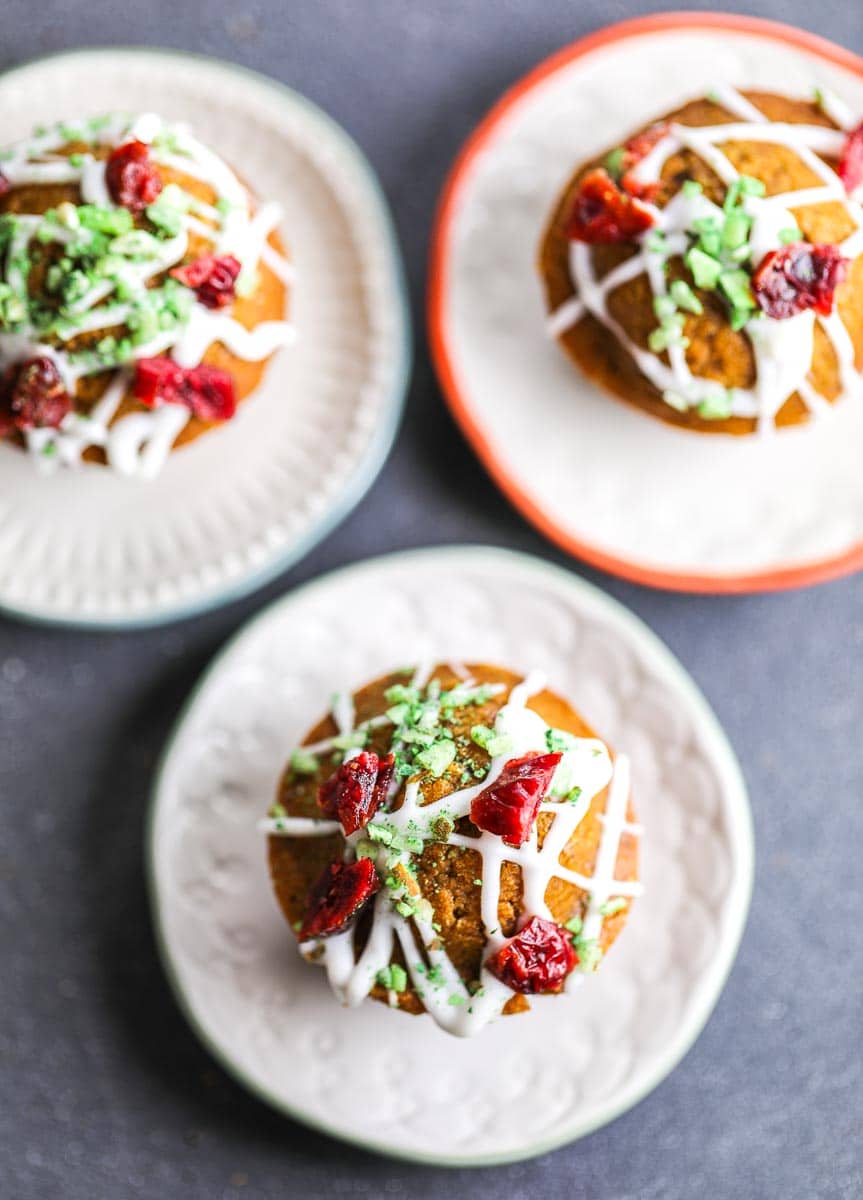
There is a lot of confusion surrounding molasses as it is found on many high FODMAP lists. Monash University and FODMAP Friendly have both lab tested molasses. FODMAP Friendly has given it a “Fail” at 15 g, but Monash tested smaller portions and gives it as Green Light Low FODMAP serving size at 1 teaspoon or 5 g. We consider a perfect example of a high FODMAP food with a low FODMAP serving size.
Our Low FODMAP Gingerbread Muffins, per serving, are low FODMAP diet compliant.
Drying fruit does change the FODMAP content of food. Just look at grapes – no FODMAPs – and raisins, which have a very specific low FODMAP serving size of 1 Australian tablespoon or 13 g.
Dried cranberries have been lab tested and Monash pegs a low FODMAP serving size at 1 Australian tablespoon or 15 g. This might not seem like a lot, but when incorporated into a recipe, like this one, they provide the chew, flavor and color we need.
There are nuts that are more user-friendly than others while following the low FODMAP diet. Individual nuts are easy enough to look up on our Monash and FODMAP Friendly smartphone apps, but for our purposes in this gingerbread recipe I am suggesting walnuts or almonds, both of which have low FODMAP serving sizes.
Nuts can be a great addition to granola (like our Pecan Pumpkin Spice), trail mix, sweet and savory recipes, as well as enjoyed out of hand. A few nuts, like pistachios and cashews are higher FODMAP, so stick with my recommendations for type of nut and quantity detailed below in the recipe.
Coconut oil, as with all oils, is low FODMAP as it is not a carbohydrate. It is easy to find both refined and unrefined coconut oil at the supermarket. Unrefined coconut oil has a strong coconut flavor and if you are making a recipe where that would be desirable it is certainly fine to use. For this gingerbread recipe, I did not want a strong coconut flavor and that is why I am recommending is a refined coconut oil, which is more neutral in flavor.
We have an article for you that discusses coconut in depth, covering all kinds of coconut products: Is Coconut Low FODMAP?
You might not realize that white, milk and dark chocolates all do have low FODMAP serving sizes. In this instance we use melted white chocolate to drizzle over the mini muffins. White chocolate is low FODMAP in 25 g portions and is present in much smaller amounts, per muffin.
Not all white chocolate is created equal; not by a long shot. Please read All About White Chocolate & FODMAPs for more info. In brief, read labels and only buy white chocolate that has cocoa butter as the only fat. This will be a higher quality white chocolate. I love El Rey and also like using Valrhona, Callebaut and Lindt.
You are probably familiar with liquid food coloring since it is easy to find in most supermarkets. Powdered food coloring is a specialty item that is used by cake decorators. It can sometimes be found in craft stores and can be ordered online.
It is not necessary to have; the nuts can be used as is. But if you want a green and red color theme, you will want to use it.
Making Mini Muffins
For the Muffins: Position rack in middle of oven. Preheat oven to 350°F (180°C). Coat 18 mini muffin tin wells with nonstick spray.
In a large bowl, whisk together the flour, baking soda and salt to aerate and combine; set aside.
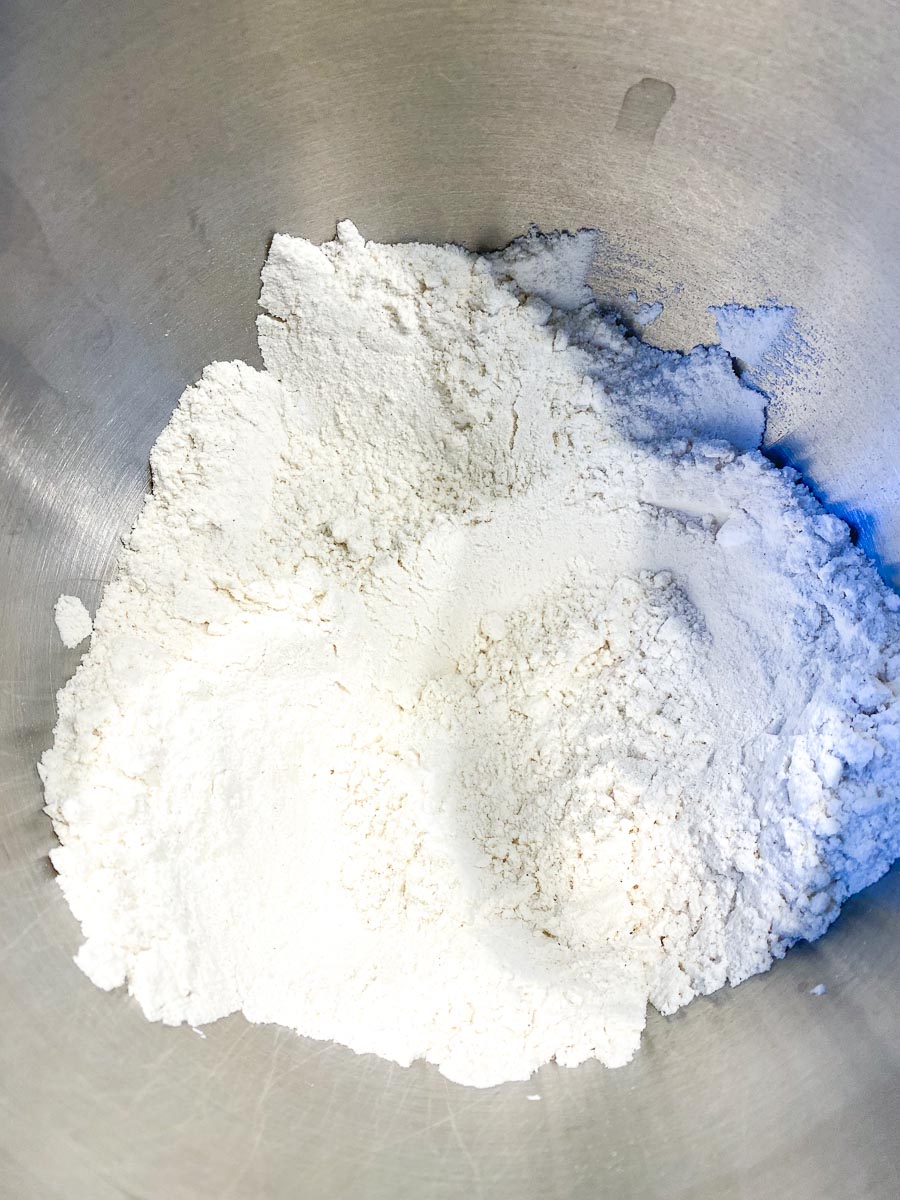
In a separate bowl whisk together the oat milk, oil, maple syrup, molasses, egg, cinnamon, vanilla, ginger and cloves until well blended.
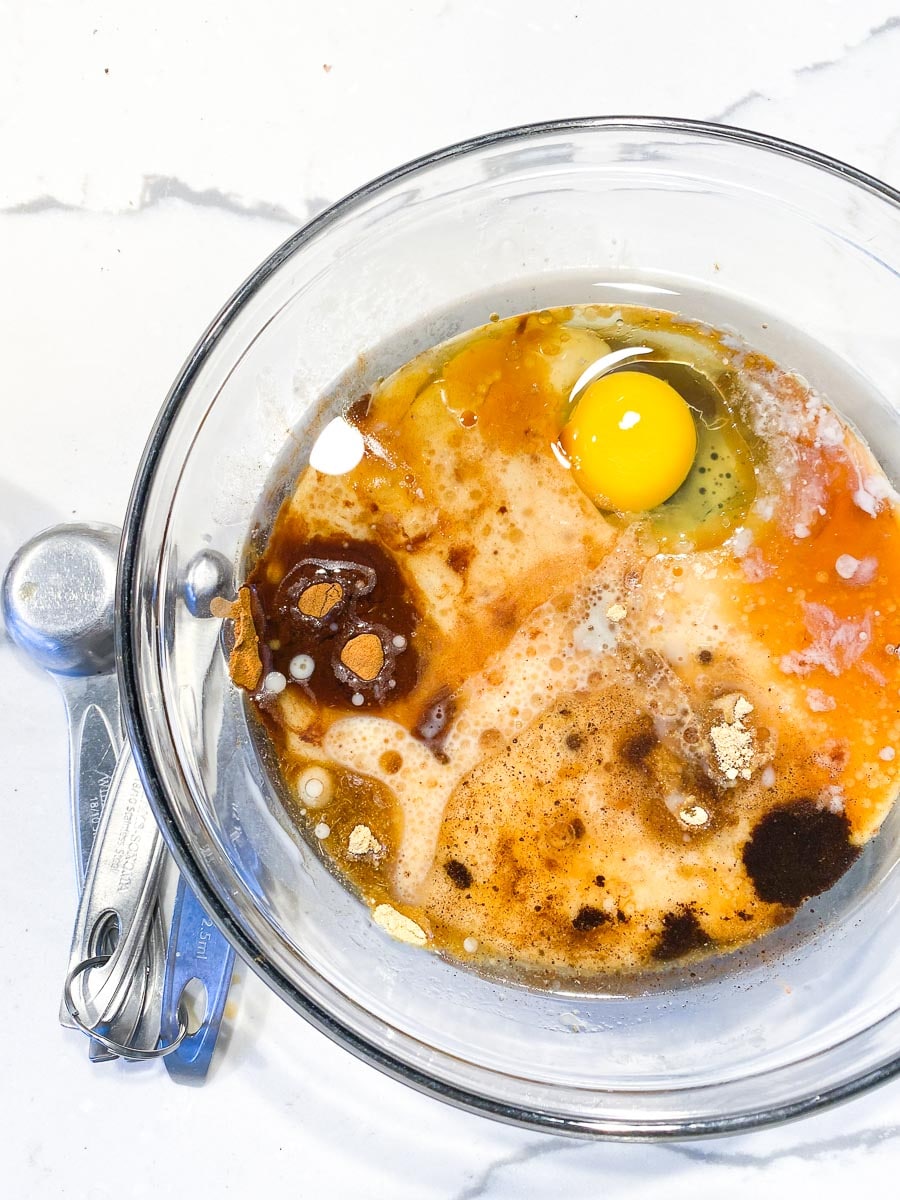
Combine the wet and dry ingredients and whisk very well until just smooth and combined.
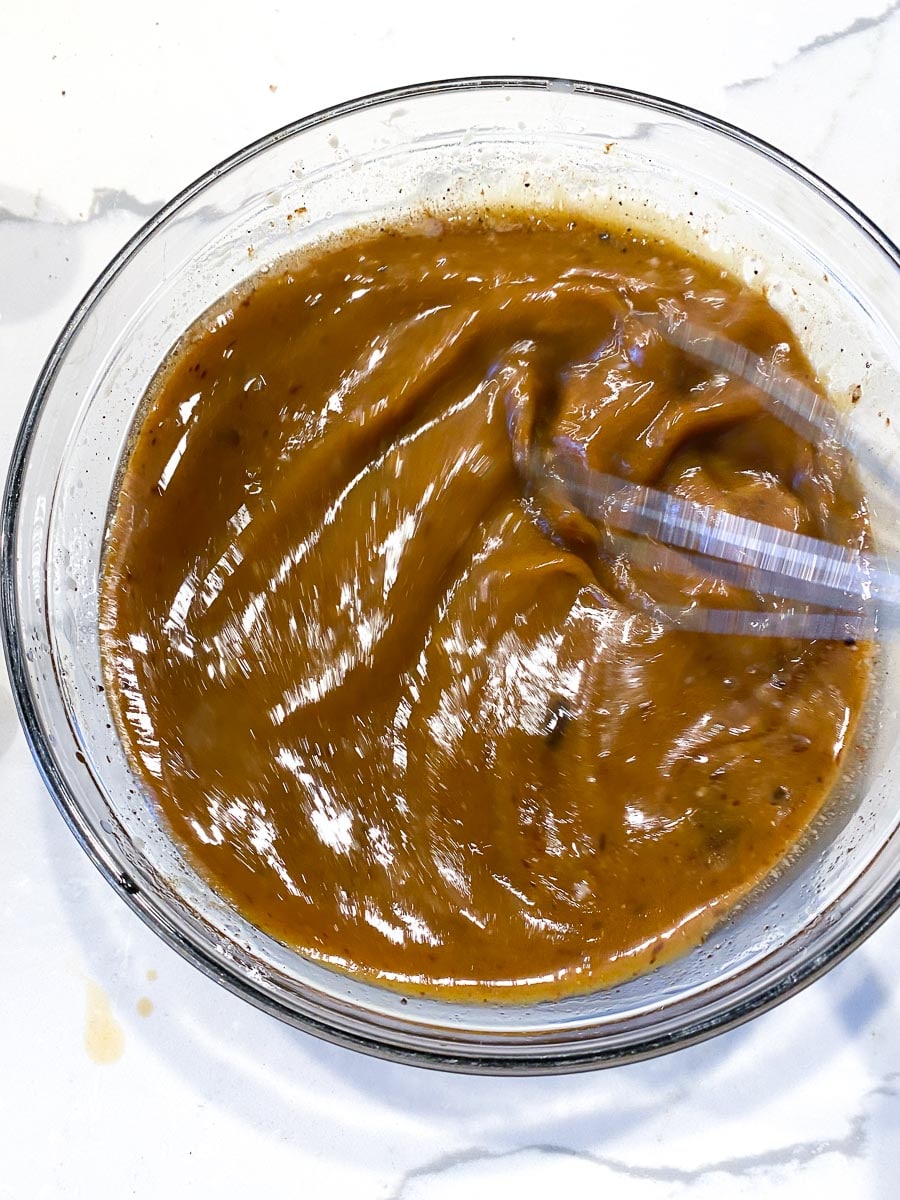
Scrape into prepared muffin pan(s), smoothing tops if needed.
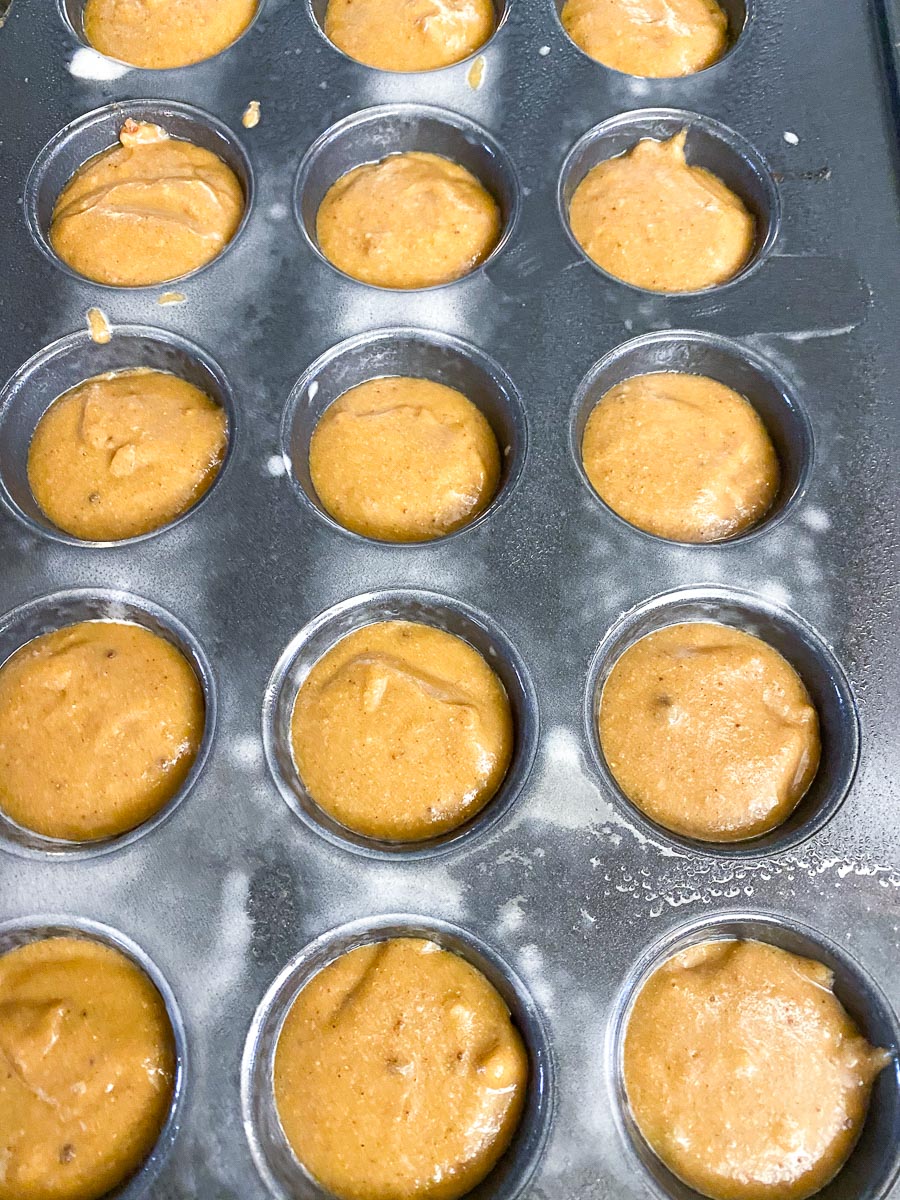
Bake muffins for about 12 to 15 minutes or until a tester comes out clean. Cool pan on rack for 5 minutes, unmold, then cool completely on rack.
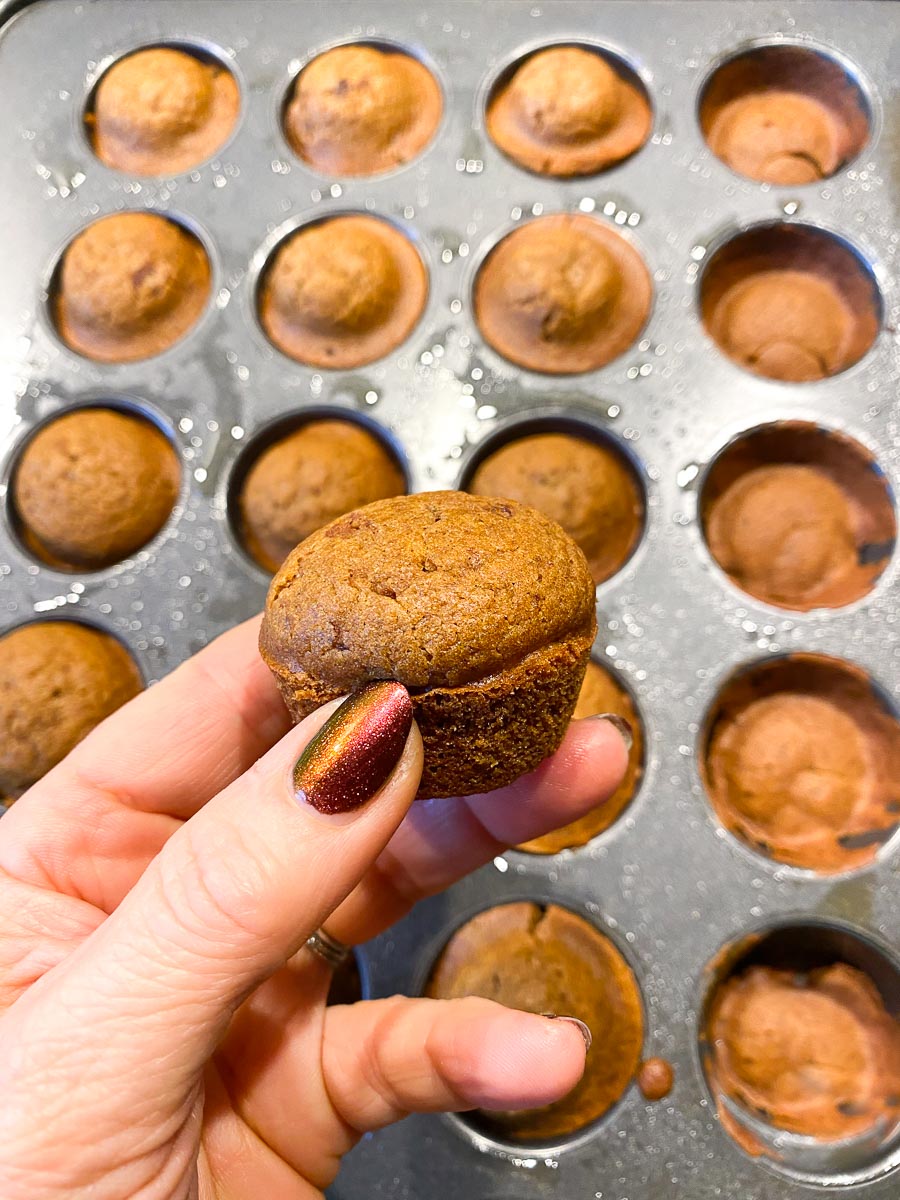
For the Topping: Toss the nuts together with a little bit of powdered green food coloring, if using. You just want them to look green, for a green/red color theme.
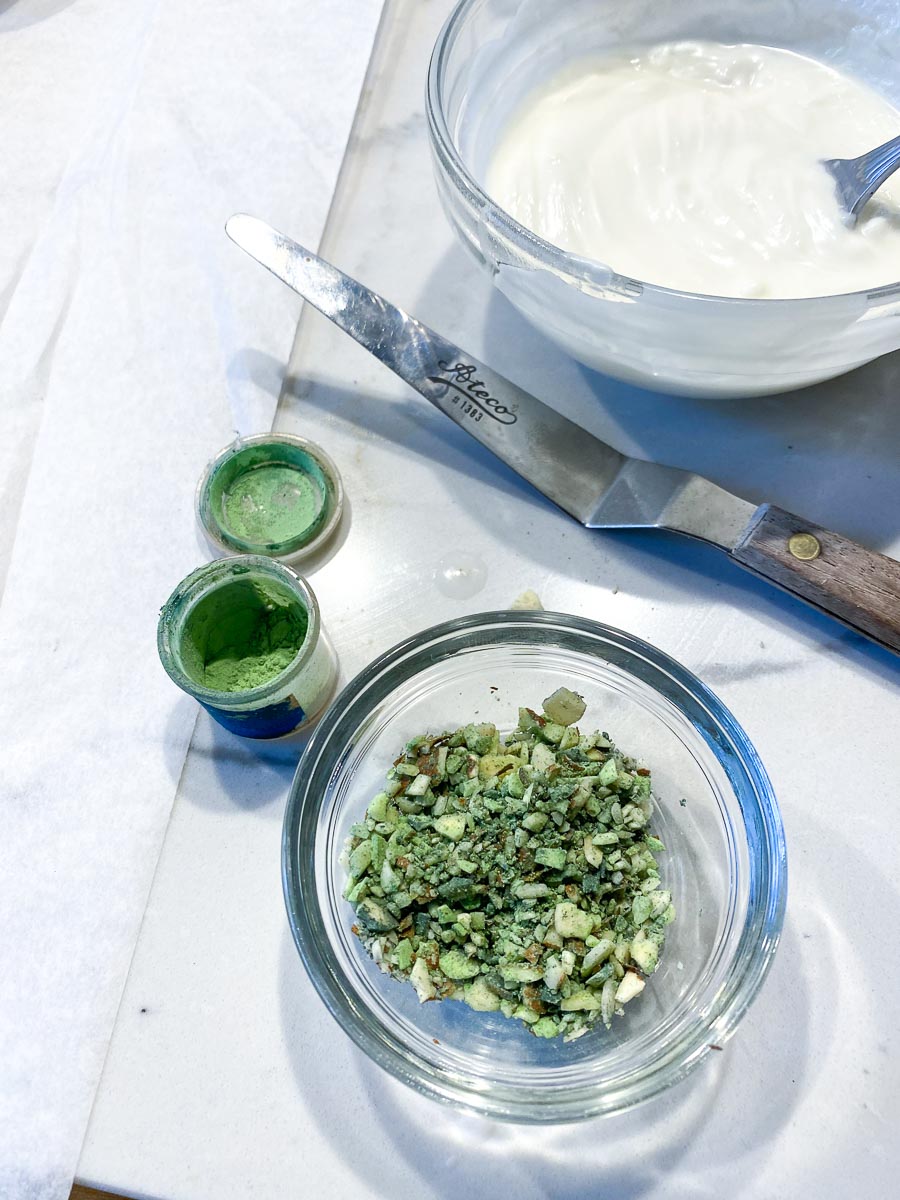
Melt chocolate and oil together in top of double boiler or microwave and stir until smooth.
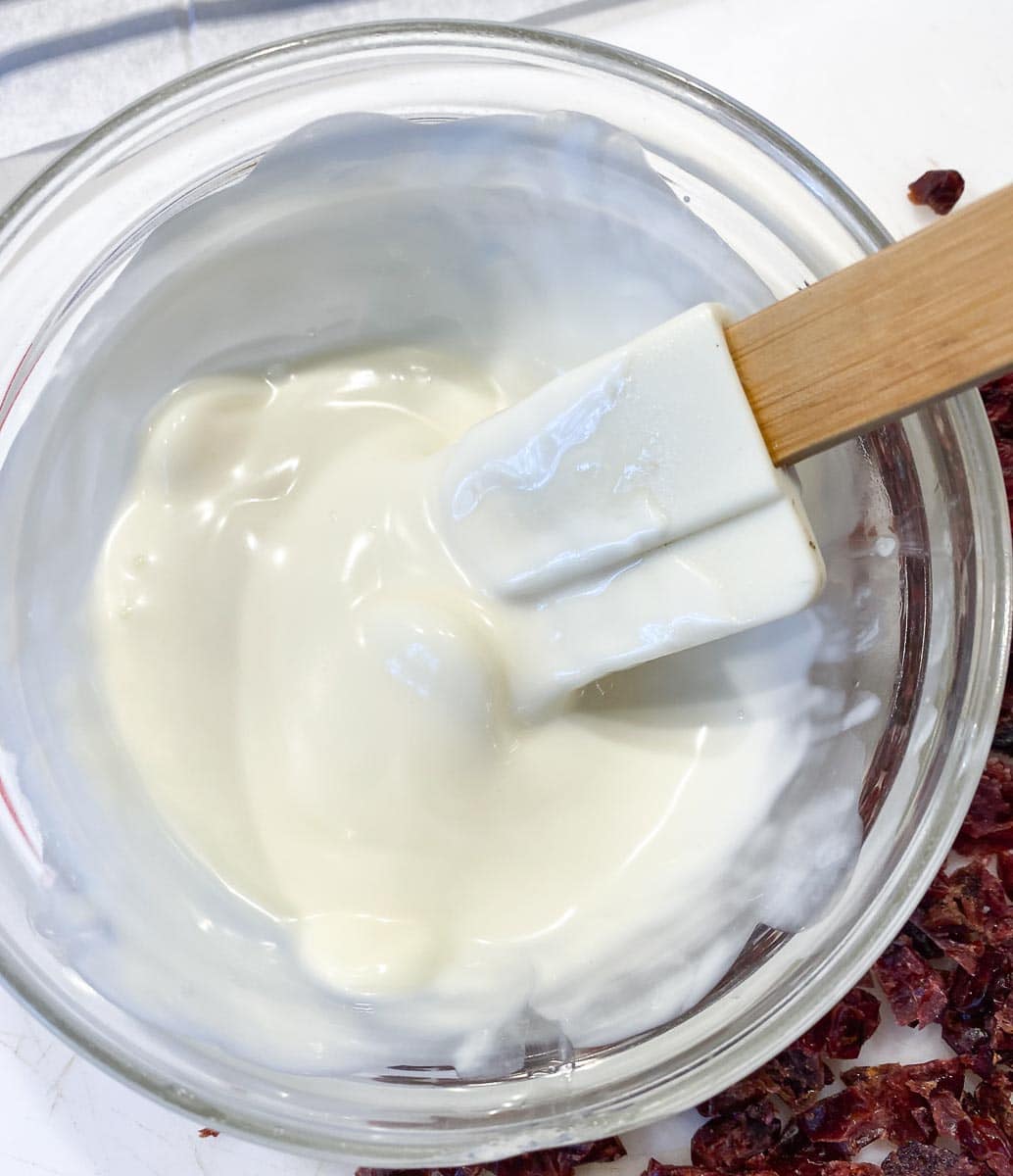
Drizzle over top of muffins with a fork (or use a parchment cone like I did).
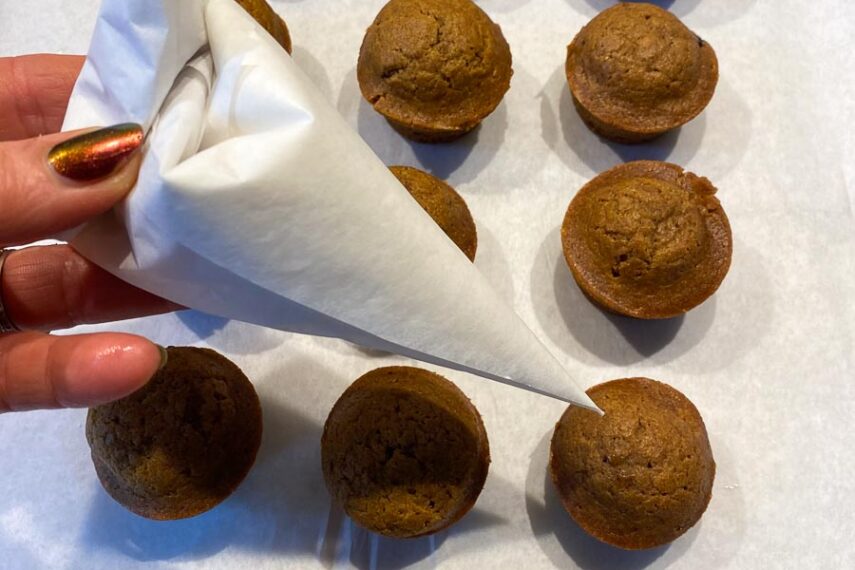
Sprinkle dried cranberries and green colored nuts on top while the chocolate is wet. Allow chocolate to set before serving. Muffins are ready to serve or may be stores in an airtight container at room temperature for 3 days. If you would like to freeze them, you may do so for 1 month, undecorated. Bring to room temperature before decorating.
TA DA! Low FODMAP Gingerbread Muffins that are also gluten-free and lactose-free!

FODMAP Information
Our recipes are based on Monash University and FODMAP Friendly science.
- Almonds: Both Monash University and FODMAP Friendly have lab tested whole almonds, and their results vary from one another. Monash says that a Green Light low FODMAP portion is 10 whole almonds at 12 g, but a high FODMAP portion is 20 whole almonds at 24 g. FODMAP Friendly gives them a “Pass” at 30 g or ¼ cup.
- Chocolate: Monash University has lab tested dark, milk and white chocolate all have low FODMAP amounts: 85% dark at 20 g; dark at 30 g; milk at 20 g; white at 25 g.
- Coconut Milk: Both Monash University and FODMAP Friendly has lab tested coconut milk for FODMAPs. Monash divides their testing into a few categories. Here are Monash’s statements: Coconut milk with inulin is Red Light high FODMAP at ½ cup (125 ml) or 120 g. There is no information on smaller amounts. UHT (long life, shelf-stable) coconut milk is Green Light low FODMAP at ¾ cup (180 g). Canned coconut milk is Green Light low FODMAP at ¼ cup or 60 g. They also have some brands represented, such as Sanitarium, and their unsweetened coconut milk, which is a shelf-stable type, is low FODMAP at 1 cup (250 g). FODMAP Friendly gives coconut milk a “Fail” at 4-ounces (125 ml) but we do not know what kind they tested. There are a few things to note. First of all, the FODMAP content obviously varies greatly depending on type of processing. Also, although “lite” or “light” canned coconut milk has not been tested, it is the same as canned but with a higher water content, so you can use the canned coconut milk amounts designated and know that you are within low FODMAP serving sizes.
- Cranberries: Both Monash University and FODMAP Friendly have lab tested cranberries. FODMAP Friendly has lab tested dried cranberries and gives them a “Fail” at 40 g or ⅜ cup. On the Monash app you will find Dried Cranberries are given a Green Light low FODMAP serving of 1 Australian tablespoon, or 15 g. On the Monash website itself they discuss fresh cranberries and state that 130 grams fresh, which is about a scant 1 ¼ cups, should be tolerated well.
- Maple Syrup: Both Monash University and FODMAP Friendly have lab tested maple syrup. Monash says that maple syrup is Green light and low FODMAP in servings of 2 Australian tablespoons (50 g). FODMAP Friendly gives it a “Pass” at 2 tablespoons (53 g). These amounts are likely recommended due to Australian healthy eating guidelines; no upper limit is posted by either Monash or FODMAP Friendly.
- Molasses: There is a lot of confusion surrounding molasses as it is on many high FODMAP lists. Monash University and FODMAP Friendly have both lab tested molasses. FODMAP Friendly has given it a “Fail” at 15 g, but Monash tested smaller portions and gives it as Green Light Low FODMAP serving size at 1 teaspoon or 5 g.
- Oil: All pure oils are fats and contain no carbohydrates, therefore they contain no FODMAPs.
- Walnuts: Both Monash University and FODMAP Friendly have lab tested walnuts. FODMAP Friendly gives them a “Pass” at ¼ cup (30 g) portions. Monash lists the same gram amount as low FODMAP and pegs the volume at 10 walnut halves.
Please always refer to the Monash University & FODMAP Friendly smartphone apps for the most up-to-date lab tested information. As always, your tolerance is what counts; please eat accordingly. The ultimate goal of the low FODMAP diet is to eat as broadly as possible, without triggering symptoms, for the healthiest microbiome
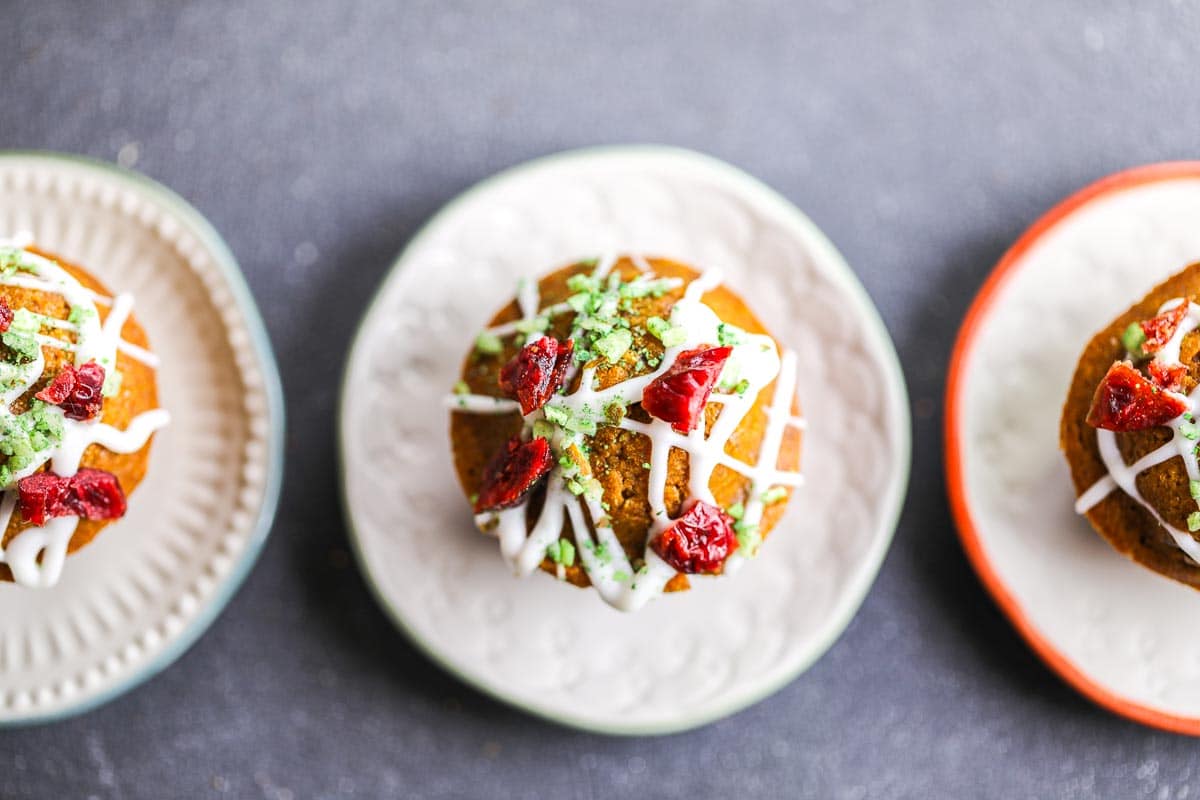
Looking for more gingerbread deliciousness? Check out our Low FODMAP Sticky Cranberry Gingerbread.

Mini Low FODMAP Gingerbread Muffins
Mini Low FODMAP Gingerbread Muffins look, taste and smell like the holidays. These have classic, rich gingerbread flavor – with a low FODMAP amount of molasses! The aromas that will waft through your home are positively irresistible. Read more about the hows and whys of this low FODMAP gingerbread recipe, which also features dried cranberries and nuts.
Low FODMAP Serving Size Info: Makes 18 mini muffins; 1 muffin per serving; 18 servings
Ingredients:
Muffins:
- 1 1/3 cups (194 g) low FODMAP gluten-free all-purpose flour with xanthan gum, such as Bob’s Red Mill 1 to 1 Gluten Free Baking Flour
- 1 teaspoon baking soda
- ¼ teaspoon salt
- ¾ cup (180 ml) unsweetened full-fat oat milk or UHT coconut milk, at room temperature
- ¼ cup (60 ml) melted refined coconut oil
- ¼ cup(60 ml) pure maple syrup
- ¼ cup(60 ml) unsulphured molasses; not blackstrap
- 1 large egg, at room temperature
- 1 ½ teaspoons cinnamon
- 1 ½ teaspoons vanilla extract
- 1 teaspoon ground ginger
- ¼ teaspoon ground cloves
- ¼ teaspoon instant espresso powder; optional
Glaze & Topping:
- 3 tablespoons very finely chopped walnuts or almonds
- Powdered green food coloring; optional
- 2- ounces (55 g) white chocolate, finely chopped
- 1 teaspoon melted refined coconut oil
- 2 tablespoons dried cranberries, chopped
Preparation:
-
For the Muffins: Position rack in middle of oven. Preheat oven to 350°F (180°C). Coat 18 mini muffin tin wells with nonstick spray.
-
In a large bowl, whisk together the flour, baking soda and salt to aerate and combine; set aside.
-
In a separate bowl whisk together the oat milk, oil, maple syrup, molasses, egg, cinnamon, vanilla, ginger and cloves until well blended.
-
Combine the wet and dry ingredients and whisk very well until just smooth and combined. Scrape into prepared muffin pan(s), smoothing tops if needed.
-
Bake muffins for about 12 to 15 minutes or until a tester comes out clean. Cool pan on rack for 5 minutes, unmold, then cool completely on rack.
-
For the Topping: Toss the nuts together with a little bit of powdered green food coloring, if using. You just want them to look green, for a green/red color theme. Melt chocolate and oil together in top of double boiler or microwave and stir until smooth. Drizzle over top of muffins with a fork (or use a parchment cone like I did) and sprinkle dried cranberries and green colored nuts on top while the chocolate is wet. Allow chocolate to set before serving. Muffins are ready to serve or may be stores in an airtight container at room temperature for 3 days. If you would like to freeze them, you may do so for 1 month, undecorated. Bring to room temperature before decorating.
Notes:
FODMAP Information
Our recipes are based on Monash University and FODMAP Friendly science.
• Almonds: Both Monash University and FODMAP Friendly have lab tested whole almonds, and their results vary from one another. Monash says that a Green Light low FODMAP portion is 10 whole almonds at 12 g, but a high FODMAP portion is 20 whole almonds at 24 g. FODMAP Friendly gives them a “Pass” at 30 g or ¼ cup.
• Chocolate: Monash University has lab tested dark, milk and white chocolate all have low FODMAP amounts: 85% dark at 20 g; dark at 30 g; milk at 20 g; white at 25 g.
• Coconut Milk: Both Monash University and FODMAP Friendly has lab tested coconut milk for FODMAPs. Monash divides their testing into a few categories. Here are Monash’s statements: Coconut milk with inulin is Red Light high FODMAP at ½ cup (125 ml) or 120 g. There is no information on smaller amounts. UHT (long life, shelf-stable) coconut milk is Green Light low FODMAP at ¾ cup (180 g). Canned coconut milk is Green Light low FODMAP at ¼ cup or 60 g. They also have some brands represented, such as Sanitarium, and their unsweetened coconut milk, which is a shelf-stable type, is low FODMAP at 1 cup (250 g). FODMAP Friendly gives coconut milk a “Fail” at 4-ounces (125 ml) but we do not know what kind they tested. There are a few things to note. First of all, the FODMAP content obviously varies greatly depending on type of processing. Also, although “lite” or “light” canned coconut milk has not been tested, it is the same as canned but with a higher water content, so you can use the canned coconut milk amounts designated and know that you are within low FODMAP serving sizes.
• Cranberries: Both Monash University and FODMAP Friendly have lab tested cranberries. FODMAP Friendly has lab tested dried cranberries and gives them a “Fail” at 40 g or ⅜ cup. On the Monash app you will find Dried Cranberries are given a Green Light low FODMAP serving of 1 Australian tablespoon, or 15 g. On the Monash website itself they discuss fresh cranberries and state that 130 grams fresh, which is about a scant 1 ¼ cups, should be tolerated well.
• Maple Syrup: Both Monash University and FODMAP Friendly have lab tested maple syrup. Monash says that maple syrup is Green light and low FODMAP in servings of 2 Australian tablespoons (50 g). FODMAP Friendly gives it a “Pass” at 2 tablespoons (53 g). These amounts are likely recommended due to Australian healthy eating guidelines; no upper limit is posted by either Monash or FODMAP Friendly.
• Molasses: There is a lot of confusion surrounding molasses as it is on many high FODMAP lists. Monash University and FODMAP Friendly have both lab tested molasses. FODMAP Friendly has given it a “Fail” at 15 g, but Monash tested smaller portions and gives it as Green Light Low FODMAP serving size at 1 teaspoon or 5 g.
• Oil: All pure oils are fats and contain no carbohydrates, therefore they contain no FODMAPs.
• Walnuts: Both Monash University and FODMAP Friendly have lab tested walnuts. FODMAP Friendly gives them a “Pass” at ¼ cup (30 g) portions. Monash lists the same gram amount as low FODMAP and pegs the volume at 10 walnut halves.
Please always refer to the Monash University & FODMAP Friendly smartphone apps for the most up-to-date lab tested information. As always, your tolerance is what counts; please eat accordingly. The ultimate goal of the low FODMAP diet is to eat as broadly as possible, without triggering symptoms, for the healthiest microbiome
Nutrition
All nutritional information is based on third-party calculations and should be considered estimates. Actual nutritional content will vary with brands used, measuring methods, portion sizes and more. For a more detailed explanation, please read our article Understanding The Nutrition Panel Within Our Recipes.
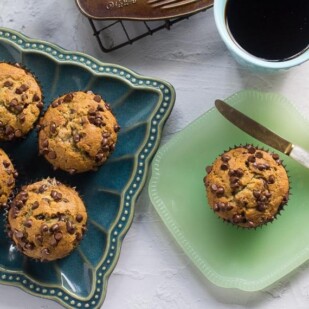
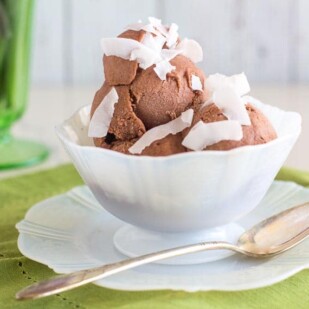



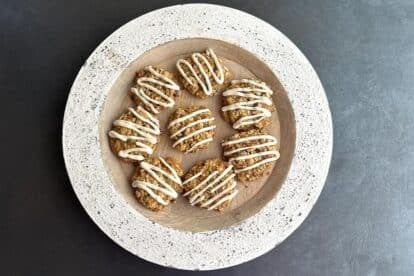
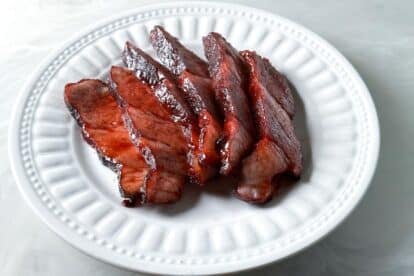
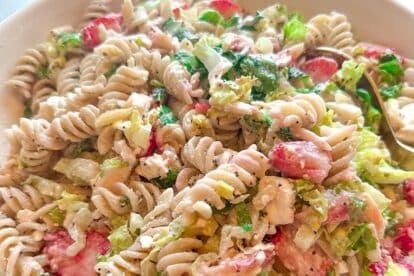
They sound great! Is there a way to make them vegan? Christmas breakfast has quiet a few dietary requirements- including gluten free, low fodmap and vegan- Do you have any other beauties that might fit these categories?
You can use our Vegan choice in our Recipe Filter to find vegan recipes on our site, which are all low FODMAP. They will be labeled GF, if they are, and 99% are.